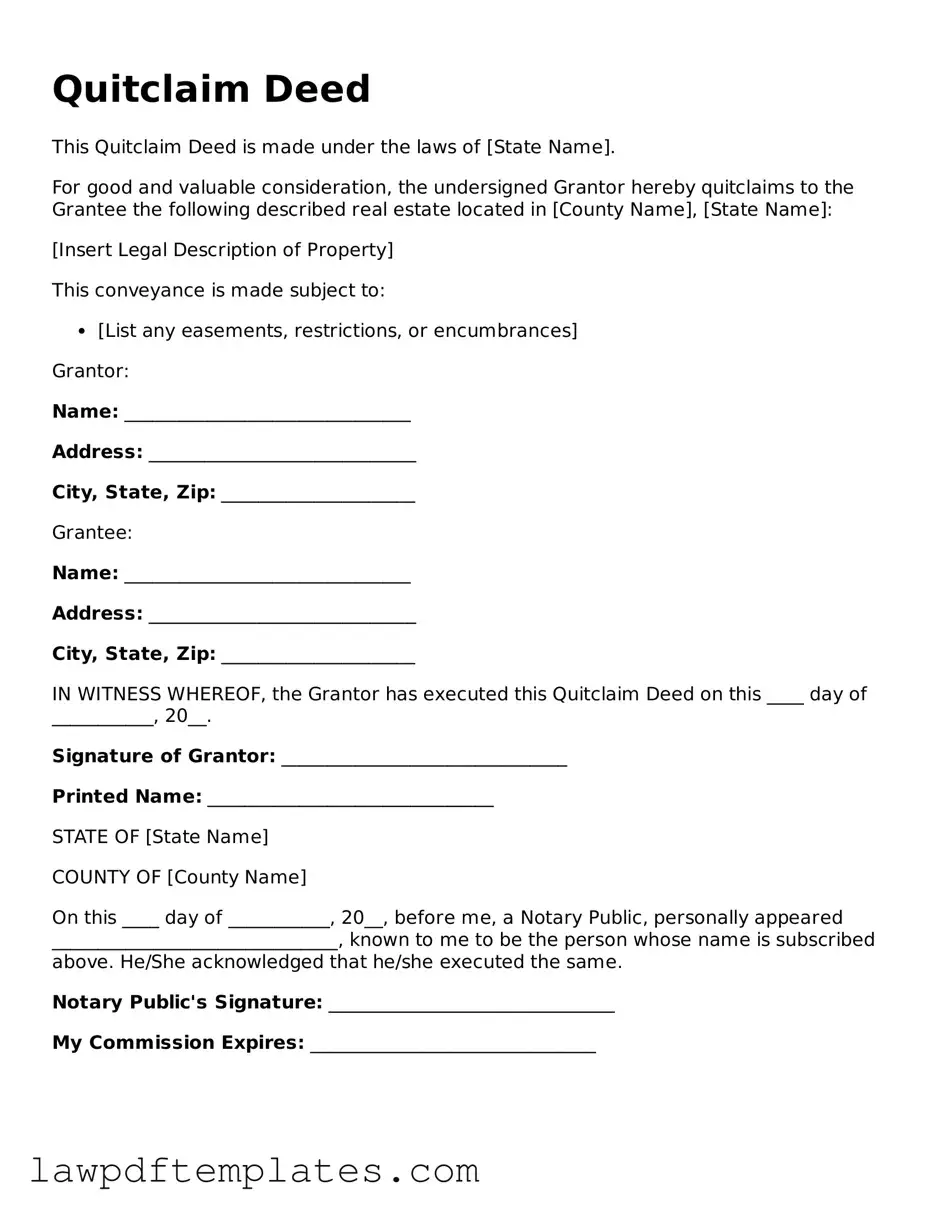Attorney-Approved Quitclaim Deed Document
State-specific Quitclaim Deed Forms
Form Breakdown
| Fact Name | Description |
|---|---|
| Definition | A quitclaim deed is a legal document that transfers ownership of property from one party to another without any warranties or guarantees. |
| Use Cases | Commonly used in situations like transferring property between family members, clearing up title issues, or during divorce settlements. |
| State-Specific Forms | Each state may have its own version of the quitclaim deed form, which must comply with local laws. For example, California's quitclaim deed is governed by California Civil Code Section 1092. |
| No Warranty | Unlike other types of deeds, a quitclaim deed does not provide any warranties. This means the grantor is not responsible for any claims or issues related to the property. |
| Filing Requirements | After signing, the quitclaim deed must be filed with the appropriate county recorder's office to make the transfer official. |
| Limitations | While a quitclaim deed is a simple way to transfer property, it may not be suitable for all situations, especially where clear title is needed. |
Sample - Quitclaim Deed Form
Quitclaim Deed
This Quitclaim Deed is made under the laws of [State Name].
For good and valuable consideration, the undersigned Grantor hereby quitclaims to the Grantee the following described real estate located in [County Name], [State Name]:
[Insert Legal Description of Property]
This conveyance is made subject to:
- [List any easements, restrictions, or encumbrances]
Grantor:
Name: _______________________________
Address: _____________________________
City, State, Zip: _____________________
Grantee:
Name: _______________________________
Address: _____________________________
City, State, Zip: _____________________
IN WITNESS WHEREOF, the Grantor has executed this Quitclaim Deed on this ____ day of ___________, 20__.
Signature of Grantor: _______________________________
Printed Name: _______________________________
STATE OF [State Name]
COUNTY OF [County Name]
On this ____ day of ___________, 20__, before me, a Notary Public, personally appeared _______________________________, known to me to be the person whose name is subscribed above. He/She acknowledged that he/she executed the same.
Notary Public's Signature: _______________________________
My Commission Expires: _______________________________
Common mistakes
Filling out a Quitclaim Deed form can seem straightforward, but many people make common mistakes that can lead to issues down the road. One frequent error is not including the correct names of the parties involved. It's essential to use full legal names. Abbreviations or nicknames can cause confusion and may invalidate the deed.
Another mistake occurs when individuals fail to provide a complete legal description of the property. This description should clearly identify the property being transferred. Omitting details or using vague terms can create problems in the future. It's important to reference the property’s address and any relevant parcel numbers.
People often overlook the need for signatures. Both the grantor and grantee must sign the Quitclaim Deed. If either party neglects to sign, the document may not be legally binding. Additionally, some individuals forget to have the deed notarized. Notarization adds an extra layer of authenticity and can be required for the deed to be recorded.
Another common mistake is not checking local laws regarding Quitclaim Deeds. Different states have varying requirements for these forms. Failing to comply with local regulations can lead to complications. It’s wise to review state-specific guidelines before submission.
Some people also make the mistake of not recording the Quitclaim Deed after it is completed. Recording the deed is crucial for public notice and to protect ownership rights. Without recording, the transfer may not be recognized by third parties.
Additionally, individuals sometimes forget to include any necessary consideration. Even if the transfer is a gift, stating a nominal amount (like $1) can help clarify the intent of the transaction. Leaving this out can raise questions about the legitimacy of the transfer.
Lastly, many do not keep copies of the completed Quitclaim Deed. It’s important to retain a copy for personal records. This can be useful for future reference or in case any disputes arise regarding the property transfer.
Consider Popular Types of Quitclaim Deed Documents
Lady Bird Title - Using a Lady Bird Deed can help preserve family properties across generations.
When engaging in a transaction for goods or property, utilizing a Washington Bill of Sale is essential, as it not only verifies the transfer of ownership but also provides clear documentation of the specifics involved. This form captures necessary details such as item descriptions, purchase prices, and sale dates, ensuring that both parties are protected in the agreement. For a streamlined experience, you can access the necessary forms through PDF Documents Hub.
Problems With Transfer on Death Deeds California - A Transfer-on-Death Deed does not create any immediate tax liabilities for the beneficiaries.
